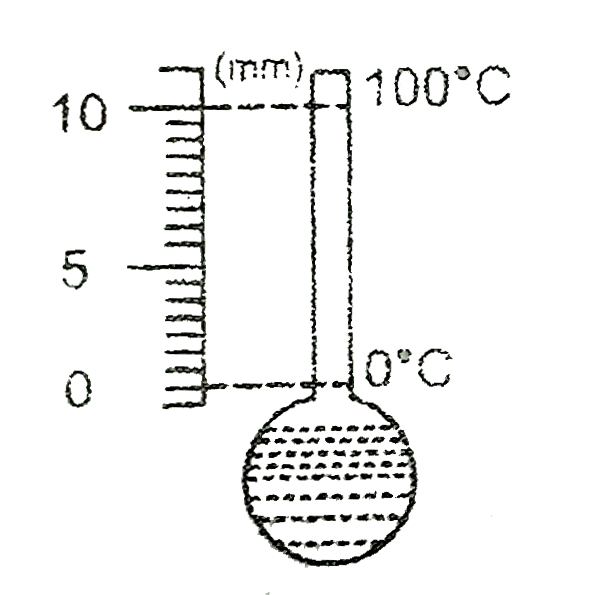
Level of a certain liquid at 0∘C and 100∘C are 0 and 10mm on a given fixed scale (as shown in fig.) coefficient of volume expansion this liquid varies with temperature as γ=γ0(1+T100) (where T in .∘C) Find the level (in mm) of liquid at 48∘C
The correct Answer is:4
dv=Adx
V0γ0(T100+1)dT=Adx
⇒V0γ0∫1000(T100+1)dT=A∫100dx
⇒V0γ0×(10022×100+100)=A×10
⇒V0γ0×150=A×10…(i)
II case
⇒V0γ0∫480(T100+1)dT=A∫x0dx
V0γ0×(4822×100+48)=A×x...(ii)
115×48(0.24+1)−x
x=1.24×3.2=3.968=4mm
Topper's Solved these Questions
- BOOK - RESONANCECHAPTER - CALORIMETRY AND THERMAL EXPANSIONEXERCISE - Exercise-21videos
CALORIMETRY AND THERMAL EXPANSION
- BOOK - RESONANCECHAPTER - CALORIMETRY AND THERMAL EXPANSIONEXERCISE - Exercie-31videos
CALORIMETRY AND THERMAL EXPANSION
- BOOK - RESONANCECHAPTER - CALORIMETRY AND THERMAL EXPANSIONEXERCISE - Exercise-11videos
CALORIMETRY AND THERMAL EXPANSION
- BOOK - RESONANCECHAPTER - CALORIMETRYEXERCISE - Exercise19videos
CALORIMETRY
- BOOK - RESONANCECHAPTER - CAPACITOREXERCISE - Exercise45videos
CAPACITOR
Similar Questions
Densities of a liquid at 30∘C and 80∘C are 0.6gmcc and 0.54gmcc . The coefficient of real expansion of liquid is
View SolutionA cylindrical container has a cross sectional area of A0=1cm2 at 0∘C. A scale has been marked on vertical surface of the container which shows correct reading at 0∘C. A liquid is poured in the container. When the liquid and container is heated to 100∘C, the scale shows the height of the liquid as 83.33 cm. The coefficient of volume expansion for the liquid is γ=0.001∘C−1 and the coefficient of linear expansion of the material of cylindrical container is α=0.0005∘C−1. A beaker has 300cm3 of same liquid at 0∘C. The two liquids are mixed. Find the final temperature of the mixture assuming that heat exchange takes place between the liquids only, and its specific heat capacity is independent of temperature
View Solution
Knowledge Check
- Question 1 - Select One
If on heating a liquid through 800C, the mass explled is 1100th of mass till remaining, the coefficient of apparent expansion of the liquid is
A12.6×10−4/∘CB0.8×10−4/∘CC1.25×10−5/∘CD1.25×10−4/∘C - Question 2 - Select One
If on heating liquid through 80∘C, the mass expelled is (1100)thof mass still remaining , the coefficient of apparent expansion of liquid is
A1.25×10−4/∘CB12.5×10−4/∘CC1.25×10−5/∘CDNone of these - Question 3 - Select One
If γ is the cofficient of a real expansion of a liquid then the temperature at which density of a liquid is 1% of its density at 0∘C is
A99γB199γC100γD1100γ
The loss of weight of a solid when immersed in a liquid at 0∘C is W0 and at t∘C is 'W'. If cubical coefficient of expansion of the solid and the liquid are γs and γ1 then W=
View SolutionThe density of a liquid at 100∘C is 8.0g/cm3 and at 0∘C is 8.4g/cm3, the coefficient of cubical expansion of the liquid is
View SolutionIf coefficient of real expansion of a liquid is 15500/0C. The temperature at which its density is 1% less than density at 00C is
View SolutionA flask cotaines 100c.c of a liquid at 10∘C. When it is heated to 1100C increase in volume of the liquid appers to be 2 c.c. Find the coefficient of real expansion of the liquid.
(α of flask is 11×10−6/∘C)View SolutionA weight thermometer contains 52g of liquid at 100C. When it is heated to 1100C,2g of the liquid is expelled. The coefficient of real expansion of the liquid is [αgIis9×10−6/0C]
View Solution

